
views
- He might want you to leave him alone if he ignores your texts or he excludes you from activities.
- He might also be looking for space if your sex life slows down or if he shows you less affection than he used to.
- If you aren’t sure what he wants, have an honest conversation about his feelings and the relationship to see where you stand.
Signs He Wants to Be Left Alone

He hangs out with his friends more than with you. While it’s definitely important for the both of you to maintain your friendships, your partner should still be your number one priority. If you find that your boyfriend or husband is constantly busy with his buddies, it could be a sign that he’s trying to take some space away from you. What to do about it: Ask him why he’s been spending so much time with his friends lately. It’s possible that he’s helping out a buddy in need, or he’s been neglecting his friendships recently. However, you may need to talk about what’s expected in the relationship and how much time you’d like to spend with him per week.
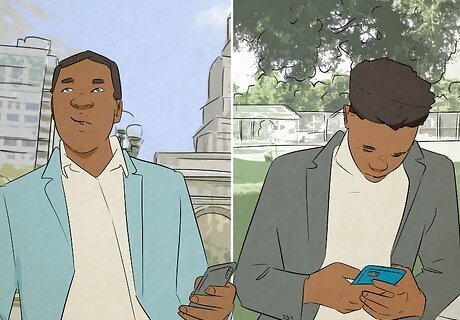
He ignores your texts or calls. Are you finding it harder and harder to get ahold of him, even when you know he’s not busy? He might be trying to signal to you that he needs some alone time or that he finds your messages overwhelming. Leaving you on read is a sign that he’s trying to avoid you. What to do about it: Talk to him about your communication style and whether or not he likes texting and calling throughout the day. There’s a chance he might just find his phone overwhelming or that he’s really bad at texting. Find a happy medium that you can both work with.

Your sex life slows down. In long-term partnerships, it’s totally normal for your sex life to ebb and flow. However, if you’ve noticed a pretty drastic change that doesn’t seem to be getting any better, it could be a sign that he’s checking out of the relationship. What to do about it: Have an open, honest conversation about intimacy, using “I” statements so he doesn’t get defensive. There are a lot of reasons why his libido might be lowered, and they don’t all have to do with your relationship.

He excludes you from his activities. Maybe an activity or hobby that you two used to do together is all of a sudden “his thing” now. While it’s not a bad thing to want some space for yourself, it could be a sign that he’s pulling away from you slowly. What to do about it: Ask him if there are still some activities you two can do as a couple. Let him know that it’s fine if he wants to do things on his own sometimes, but that you really like spending time with him, too.

He’s avoiding eye contact with you. As humans, we automatically make a lot of eye contact with those that we’re interested in. On the flip side, if he’s constantly avoiding your gaze, it could mean that he’s not as into you as he once was before, or that he’s avoiding telling you something heavy. What to do about it: Talk to him and see if he’s doing okay mentally. While a lack of eye contact can sometimes mean his feelings toward you are changing, it could also indicate that he’s struggling with his mental health.

He shuts down instead of arguing. When people stop fighting, it means they don’t care anymore. While it might sound strange, having arguments with your partner is actually a good thing: it means you trust each other enough to work through disagreements as a couple. If your partner won’t engage with you anymore when you two are fighting, it might mean that he’s checked out of the relationship. What to do about it: Open up a conversation by telling him you’ve noticed that he’s shutting down. Just say it as an observation, like, “I noticed that you don’t seem interested in working through issues with me anymore. Is everything okay?” This will open up the line of communication so you can have a deeper talk about the relationship as a whole.

He’s passive-aggressive toward you. Maybe he’s very sarcastic with you, or maybe he is patronizing when he talks to you. Look for signs of passive-aggressive behavior to see if he’s asking for more space. What to do about it: Ask him why his behavior has changed while reminding him about the importance of communication. You aren’t a mind-reader, and him being passive-aggressive won’t fix any problems. Approach him calmly and start a conversation about why he’s been acting strange lately.

He stops communicating with you. A lack of communication could mean the relationship is breaking down. At the foundation of any healthy relationship, there’s a solid core of open communication. If your man more often than not stays silent or doesn’t talk to you, he may just want to be left alone. What to do about it: Schedule times to talk with him. Communication is important, but you can’t force him to talk to you. If he’s going through stuff or he’s just tired, ask him when would be a better time for the two of you to chat.
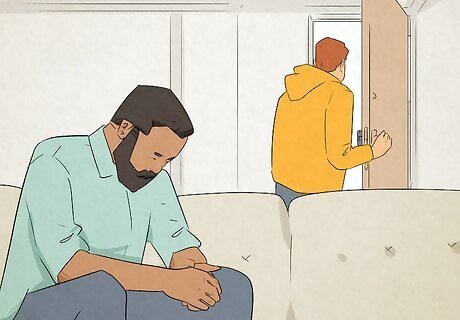
He doesn’t want to be around you. Avoiding your presence is a clear sign he needs space. This is not a great way for him to express his emotions, but the conclusion is the same: if he doesn’t want to be around you, then he’s likely rethinking the relationship. He might criticize you for trying to talk to him or scoot over when you sit down next to him. What to do about it: Ask him if you’re stressing him out. In some cases, your partner may need a little break from you because you’re the cause of their stress. It’s important to take responsibility and do what you can to change your behavior so he stops feeling this way.
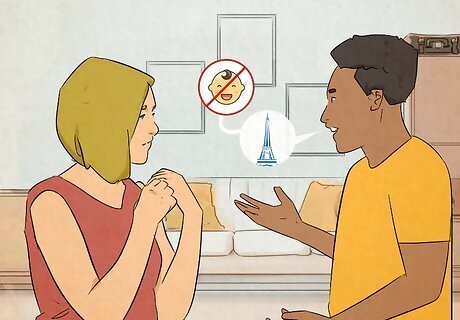
His goals or hobbies change dramatically. He might want to move to a new city, or he might be pursuing a new career path. If you two were always on the same page and now suddenly he’s done a total 180, that’s a red flag. What to do about it: See if your future goals are still compatible. It’s totally normal for partners to change and grow as they age, but sometimes, that means the relationship can’t continue.

He doesn’t start conversations with you. Partners should chit-chat with each other about their days and what they’re up to. While it doesn’t have to be split evenly at 50/50, your partner should show that he wants to talk to you by starting conversations with you. If he doesn’t, he may be taking some space for himself. What to do about it: Give him his space until he comes to you. If he hasn’t talked to you in a couple of days, test the waters by sending him a quick message checking up on him. Hopefully, he’ll be able to figure out his feelings.

He isn’t affectionate toward you anymore. A lack of physical affection could mean that his feelings are fading. If there are no more kisses, hugs, or hand-holds in your relationship, that’s a red flag. While it’s normal for those things to fluctuate as you and your partner are together for a long time, completely stopping any affection at all might mean that he’s pulling away. What to do about it: Initiate affection yourself. Try holding his hand or giving him a peck on the cheek. Hopefully, he realizes that you’re trying in the relationship.
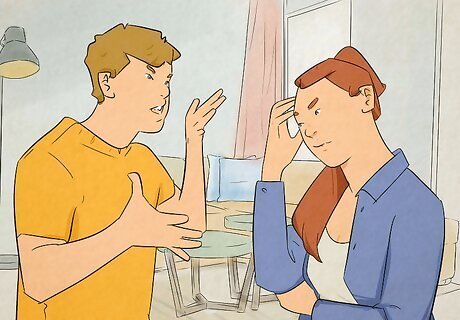
He picks fights with you all the time. He might pick fights about things that used to be no big deal, like when you’re running a few minutes late or when you bought the wrong brand of chips. He may be subconsciously fighting with you so that you get fed up and leave. What to do about it: Ask him why he’s been so volatile lately, and try not to get angry back. Force him to confront his feelings by having an open, honest conversation about the relationship.

He isn’t jealous anymore. A lack of jealousy may indicate he’s checked out. While a jealous partner isn’t always what you want, if your guy isn’t jealous at all anymore (and he used to be), it’s likely that his feelings have changed. Maybe he’s not as invested in the relationship, or he’s feeling burnt out and he just needs some space. For instance, maybe your partner hated it when you would hang out with other guys alone, but now he doesn’t mind. Or, maybe he was always jealous of your close guy friend, but now he’s encouraging you two to hang out.

He asks you for space directly. It can sound scary at first, but a partner who asks for space is confronting their own feelings and doing what’s best for them (and for your relationship). If he’s approached you directly and asked for some time apart, do your best to honor that. What to do about it: Give him his space, but ask him for a timeline. That way, you won’t be stuck in limbo forever, and he can use his communication skills to tell you what he needs from the relationship.
Why are his feelings changing?

The two of you aren't compatible. Even if your personalities clicked at first, it can be hard to maintain a relationship without much common ground. Once the initial spark of infatuation fades away, it can be tough to reconcile a relationship between two people with almost nothing in common.

He's not managing his toxic thoughts in a healthy way. The longer you're in a relationship with someone, the more it can sting when conflicts, disagreements, and personal jabs arise. These situations can lead to a variety of toxic thoughts (like "You should know how much it annoys me when you say things like that" or "My partner can never be wrong about anything"). If these thoughts aren't managed with solutions like open communication and positive thinking, his feelings could start to change.

Infidelity or similar events might cause his feelings to change. Dishonesty and betrayal are heavy blows to any relationship, regardless of the intent behind the cheating acts. If something along this vein recently occurred in your relationship, it could explain why his feelings are changing.
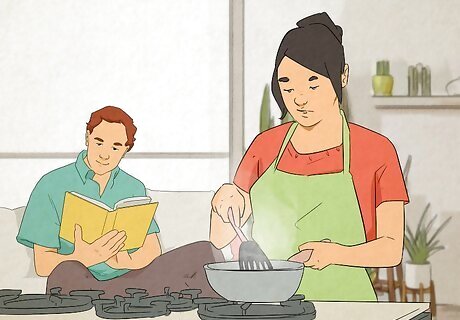
Shifting feelings are a normal part of a long-term relationship. Most relationships start in a "honeymoon phase," where you and your partner feel super infatuated with one another. During the second phase, you both focus on merging your lives together. It's the third phase, however, where things get tricky—you often feel disillusioned, and wonder if your partnership is meant to be. Your partner pulling away could be a sign that he's experiencing this phase of the relationship.
What to Do Next

Take some time to ground yourself and review what's going on. Do an activity that helps ground you in the present moment, like hopping in the shower, doing deep breathing exercises, or writing in a journal. From there, focus on your most recent interactions with your partner. What possible explanations are there for what's going on? If you chatted with a loved one or friend, what would their perspective be? These insights can help you view the situation in a clearer light.
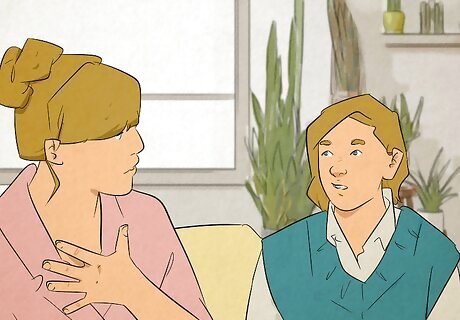
Discuss your needs with your partner using I-statements. Starting your sentences with "you"-centered language ("you did this or that") can easily put someone on the defensive. Instead, focus on communicating your needs going forward in the relationship, like: "I really love getting to have one-on-one time with you. Could we try spending more time together at least once a week?" "I really appreciate hearing about your day. Would you be open to shooting me a few texts every so often?"

Talk with your partner about mutually taking space for yourselves. Taking space can be a productive way to heal your relationship—as long as you both approach the time apart with the same expectations. Before taking space apart from one another, agree to focus on healing and self-reflection during this time.


















Comments
0 comment